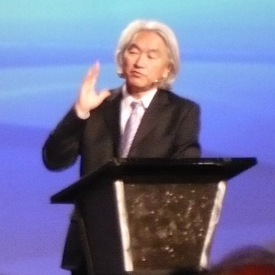 One of this blog’s early claims to Twitterati fame was that Dr. Michio Kaku followed the @FutureCon stream for about a year or so. At the time, I thought it was a personal honour to have such a respected scientist interested enough in the blog to keep an eye on it; which made it all the more interesting to see that his newest book Physics of the Future: How Science Will Shape Human Destiny and Our Daily Lives by the Year 2100 took a specifically futurist viewpoint.
One of this blog’s early claims to Twitterati fame was that Dr. Michio Kaku followed the @FutureCon stream for about a year or so. At the time, I thought it was a personal honour to have such a respected scientist interested enough in the blog to keep an eye on it; which made it all the more interesting to see that his newest book Physics of the Future: How Science Will Shape Human Destiny and Our Daily Lives by the Year 2100 took a specifically futurist viewpoint.
Having read through the book, there’s nothing specifically in there which I could say came from Future Conscience; but it’s nice to know nonetheless that the blog might have had some small influence. Overall, ‘Physics of the Future’ is a great introductory text that is perfectly suited to the mainstream popular science audience that it is targeted at. This is not to say that the book is without its faults, but it is a book that at the outset of this review I would recommend to anybody interested in the future of science, technology and society.
Unlike other futurist authors who can slip a bit too much into passionate visionary rhetoric (Kurzweill and the Singularitarians we’re looking at you), Prof. Kaku from the outset takes a very measured approach to his predictions for the next century of scientific progress. Here is a book that tries to build predictions of the future upon solid scientific foundations and projections, and it does what it sets out to do very well.
To begin with, he’s not just basing the book on his own personal predictions but has canvassed more than 300 cutting-edge scientists in various fields to try and arrive at some kind of consensus. This focuses the chapters of the book around particular categories such as medicine, energy, nanotechnology or computing and brings out a lot of personal anecdotes about visiting various labs or research departments that the author has had the opportunity to see first hand.
This focus provides a good structure (which is further sub-divided into exploring each topic according to different timeframes over the next 100 years); but does overlook some important social and cultural categories; such as surveillance/profiling, entertainment, or spirituality. However, to judge the book on those grounds would be unfair – this is the ‘Physics of the Future’ after-all, so the focus is very much on our scientific rather than cultural future (although of course, the two are interdependent and the book does recognise that).
As an overview of futurist thinking it’s a wonderful introduction. In this respect, I would recommend the book to anybody wanting to come to terms with the rapidly changing modern society that we find ourselves in. The whirlwind tour covers a lot of ground in a relatively short space, and there’s plenty in there to get your imagination going.
Be ready to be taken on a journey that covers the rise of artificial intelligence and the role that robots might play in our future; that explores how rapidly medicine will advance in our quest for longevity and the ability to overcome problems such as cancer or hereditary disease; all the way to how long it might take to colonise the moon, Mars, or even explore the rest of the galaxy. It’s refreshing to see that the vision presented is overall an optimistic one, even discussion on topics such as climate change takes a positive viewpoint which is rare these days, and even the more cautionary sections are peppered with hopefulness.
It’s also written in a language that is easy to digest, although this sometimes works to the book’s detriment as the writing can come across as dry and not as engaging as it should be given the subject matter. Unfortunately, the writing standard doesn’t match the other book of Kaku’s that I have read (Parallel Worlds) and there are parts of it which clearly needed to be redrafted a few more times in order to do justice to the truly inspiring content. This criticism sums up my thoughts on the book as a whole, actually, which is that it is a book that I am in two minds about.
I enjoyed reading it and would recommend it, yet I didn’t feel like I really learnt anything that I didn’t already know (i.e. it’s a basic primer to futurist thinking). The writing style is accessible and it’s an easy book to finish even for the casual reader, but it lacks a certain depth of vision or passion (though you can certainly see glimpses of Michio Kaku’s infectious enthusiasm). In parts, the text repeats itself unnecessarily and could have done with further editing as there are some areas which feel like they have been cut-and-pasted into multiple sections and the repetition gives away this piecemeal writing strategy.
Overall, the book has a high standard of scientific rigour and a far-reaching enough focus to be ‘futurist’, but leaves aside many of the truly pertinent social and cultural upheavals that we will face over the next century – giving them basic lip-service at best – and also slips into a viewpoint that directly equates scientific advancement with ‘progress’ that this blog in particular is trying to challenge.
Science will be the driving thrust of our future direction, but we should not fall into the trap of thinking that it can only ‘progress’ towards something ‘better’ or more ‘complete’. The reality of the situation is more nuanced than that, which is something that the book seems to gloss over in favour of a fervent zeal for science’s ability to overcome all adversity.
I don’t want to sound overly harsh on the book, because it’s an enjoyable read that does what it sets out to do well (minus the editorial and literary issues), but I just feel like it’s somewhat of a missed opportunity given how widely read it will deservedly be. It’s definitely going to fit with the popular science crowd that devours these books at an increasing rate, but I’m worried that it won’t give them too much pause for thought about the true implications of what is being discussed and how we must all – as individuals – engage with these issues at a fundamental level rather than merely being dragged into a future that we played no role in envisaging.
But if I take off my overly critical reviewers hat for a minute and just express my impression of the book, then it is one that I would recommend to anybody interested in getting up to speed with the futurist school of thinking. For those of us who are already grappling with these issues, expect a good overview with some worthwhile nuggets in there (such as the economic implications of Moore’s Law plateauing, or the use of nanoships for galactic exploration) but don’t expect a text that delves too deeply into the social implications of these developments (which is the true core of futurist thinking).
Having said this though, I must commend the book on its measured approach to prophesying the future; one which will help to bring futurist thinking back into the realms of rigorous dialectic discourse rather than further promote the overzealous – some might say semi-religious – tones of many within the field.
If nothing else, you should pick up the book for a friend or loved one because as an introduction to futurist thinking it is one of the best (and probably most accurate). Buying this book for someone else will almost certainly cause them to begin to share your passion for the future and be led to an understanding that the next 100 years is really going to impact our lives more than most realise.
The time for futurists to be taken seriously is right now, and the next decade will be vital to this particular field of thinking. Books such as ‘Physics of the Future’ by Michio Kaku, a true leader and visionary not only in his field but in the popular science movement as a whole, is a very real indication of just how important this kind of thought is becoming.
For this reason alone, anybody who considers themselves a futurist will want to read this book; even if only to more clearly see the uphill challenge we face in bringing mainstream society to the understanding that the future is not merely something to be marvelled over for the technology it will bring on the back of scientific advancement.
Rather, the future of humanity is something that we must actively pursue with a vision of virtuous responsibility and careful foresight lest it be led astray by the short-term thinking of corporate profit margins or government election terms. At the core of the futurist vision must be a cultural paradigm that enables us to incorporate the rapidly changing world around us into a social identity that encourages empathy and compassion over individual or corporate interests. This book is a good beginning, but much more work is needed yet…

![[Review] Physics of the Future by Michio Kaku](https://www.futureconscience.com/wp-content/uploads/2011/07/MichioKaku_commons-125x125.jpg)



